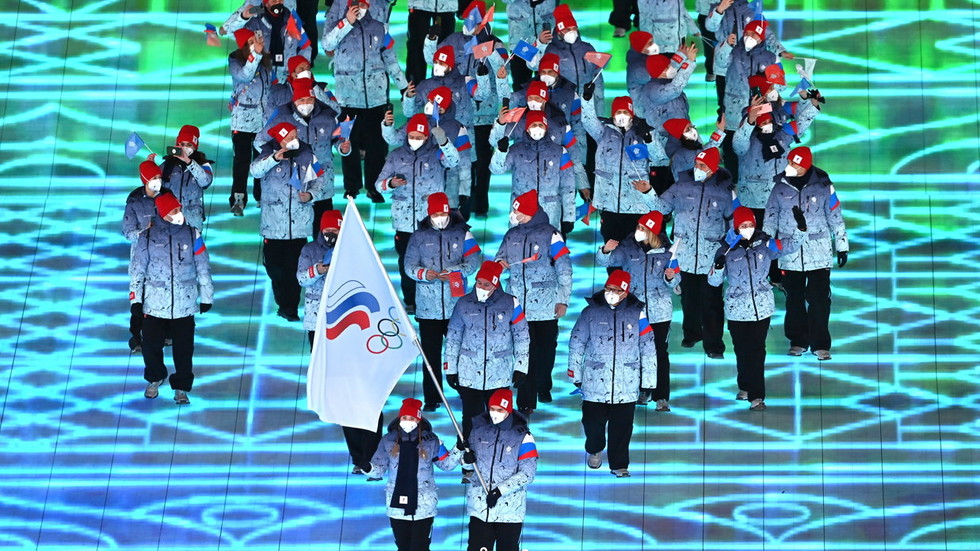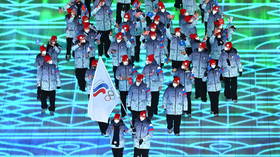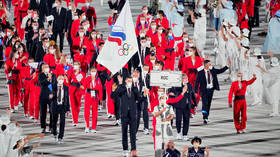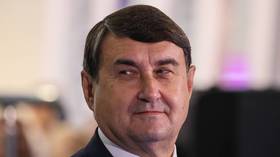
Russian athletes are hoping to be cleared in time for qualifying events ahead of the Paris 2024 Games

The Russian team at the 2022 Winter Games in Beijing. © Ramsey Cardy / Sportsfile via Getty Images
The US Olympic and Paralympic Committee (USOPC) supports the idea of allowing Russian and Belarusian athletes to compete at the 2024 Paris Summer Olympics, as long as they don’t participate under their nations’ flags or use their colors. The stance was confirmed by the organization’s chair, Susanne Lyons.
Russian and Belarusian athletes are banned from global competitions in numerous sports after federations followed an International Olympic Committee (IOC) recommendation to take action when the military operation in Ukraine was launched in late February.
Last week, however, a declaration after an IOC Summit in Switzerland paved the way for athletes from the two countries to return, citing the need to ensure sport is not undermined by politics.
The USOPC has similarly changed tack after supporting the initial IOC recommendation and subsequent ban for Russians and Belarusians.

Lyons attended the Olympic Summit in Lausanne last Friday, and told the Wall Street Journal that the entire group – including high-ranking IOC officials and heads of the swimming and gymnastics federations – agreed to bring back Russian and Belarusian athletes to the Games as neutrals, which is a notion she supports.
“Even though this leaves a pretty foul taste in your mouth, to look like you’re sliding back on this, it really is essential to the [Olympic] movement,” Lyons said regarding athlete inclusion.
With only the National Olympic Committees of the US, China and Russia present at the summit, Olympic officials discussed holding some Paris 2024 trial events under the Olympic Council of Asia banner in anticipation of objections from European countries, Lyons confirmed.
Lyons claimed that the IOC’s sanctions for Paris 2024 – which include not using the Russian and Belarusian flags, anthems, colors, or any other identifications of the countries – would be stricter than those at the 2022 Beijing Winter Games, where Russia had to perform as the Russian Olympic Committee (ROC) due to the fallout from a doping row.
“The US is supportive of finding a way for the athletes who have trained all their lives for this to be able to come back and compete,” Lyons explained.
“But we are very opposed to them coming back under their country’s imprimatur at the moment, while their governments are being sanctioned.”
The IOC recommended that sports federations and event organizers refrain from inviting or allowing Russian and Belarusian athletes and officials to international competitions as it felt Russia violated the Olympic Truce by launching the military operation during the period surrounding the Winter Olympics and Paralympics.

Furthermore, Olympics and Paralympics officials feared there could be potential clashes between athletes and officials from the conflicting countries, which Lyons addressed.
“As a practical measure, you had to separate everybody,” she said. “And so, we absolutely supported at that time, banning them – certainly from the Games, and from everything at that time.
“So what we talked about (Friday) was: Is the need for those protective measures the same? And the feeling is, while the catalyst for this is still present, which is obviously the invasion in Ukraine, the specific safety of athletes issue is not the same as it was.”
Lyons believes that the larger risk to the Olympic movement is national governments denying visas to athletes from certain countries and putting pressure on their own athletes not to take part in competitions against them.
“We don’t want individual countries based on politics deciding who they or their athletes should engage with,” Lyons stressed.



